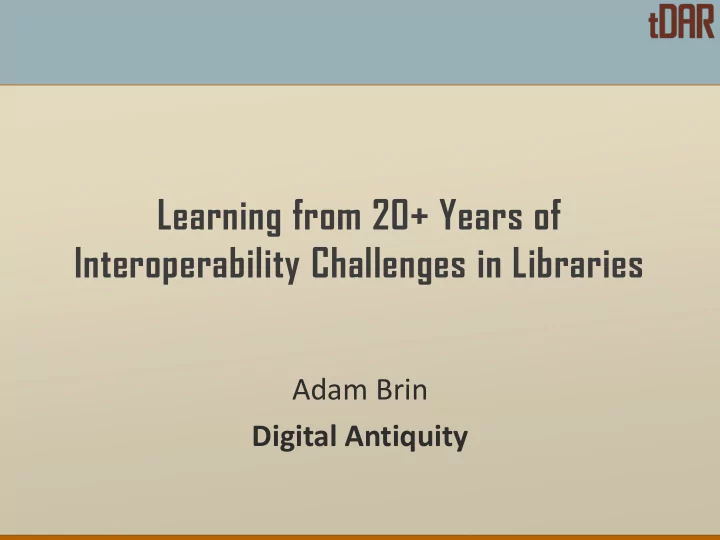

Learning from 20+ Years of Interoperability Challenges in Libraries Adam Brin Digital Antiquity
Back in Time How did you do your research? • Spirs • SOAP • WebSpirs • SRW/SRU • Z39.50 • Metasearch • Telnet • Google Scholar • Pazpar2 • Journal Indexes • XML Gateways • OpenURL
Broadcast Search Proquest User Web of JSTOR Knowledge Library Catalog
Broadcast Benefits Challenges • Always up-to-date • Slow • Better overview of results • Only see top x results from any provider • Gets user quickly to more • Have to learn lots of advanced interfaces interfaces • Full-text • Only keyword searching
Tag Gateway
Shared Index Proquest JStor Library Catalog Shared Index
Shared Index Benefits Issues • Faster • Often not as recent (data loads may be • Single interface nightly/weekly/monthly) • Search often supports more • Harder to maintain features • Search may not have access • Search can be enhanced to full-text with better matching and • One provider may results because metadata is local overwhelm results
Shared Index
Automated Linking Benefits Challenges • More dynamic • User may end up in a blank screen • Protocol often built around • User may go in circles less precision • More customized to user
Linking
Technologies go in Cycles Centralized Broadcast Centralized Broadcast Centralized
Shared Issues • Metadata Mapping • Shared Vocabularies • Granularity of Objects • Security/Permissions • Protocols • Updates • Performance
Success Stories • Google / the web • RSS • Linking • OAI-PMH Why are these successful? Simplicity, ubiquity.
What can we learn? • Use industry standards wherever possible. • Keep the technology as simple as possible. • Develop a shared data standard with both a grammar and a vocabulary.
More Lessons • Keep data at same level of granularity. • There is a direct relationship between the complexity of what you want to do with interoperability and the success of reliably doing it. • Build in assumption for error. • Linking works, but we have to be careful in how we link.
Thanks
Recommend
More recommend